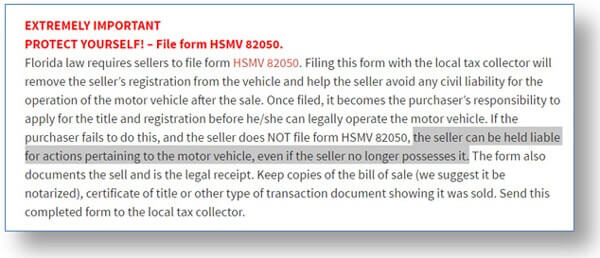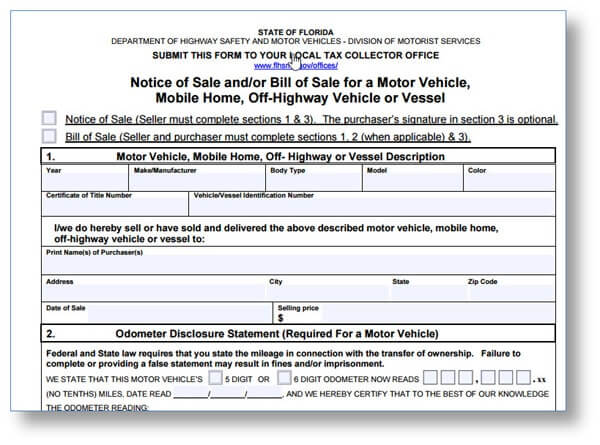How to Protect Yourself From Liability When Selling Your Used Car
Selling your car does not mean it's a done deal until you take proper steps to protect your liability after the sale.

Florida DMV warns sellers of liability even after they sell their car
There is no doubt that selling your used car is one of the most aggravating and stressful situations that most people find themselves in. There are a lot of picture taking, videos, research, phone calls and haggling hurdles which lead up to that happy moment you finally receive money from a buyer and say goodbye to your old car forever.
Yeah my car is finally sold! Or so you thought...
But what do you do to protect yourself from liability if the person who buys your car commits a serious crime, gets parking tickets, gets toll violations, or kills a family of 4 in a crash? We have a lot of visitors here at CarBuyingTips.com who are paranoid about life coming back and biting them after their car is no longer in their possession and they thought any problems associated with the car going forward are someone else's issue to deal with.
Yes you really can get in trouble for something the buyer does with the car you sold them
You might recall that last year in Texas City, Texas, the owner of Mark-1 Plumbing sued a Ford dealership for more than $1 million of losses and damage to his company's reputation because a pickup truck he traded in ended up with Islamic militants fighting in Syria. The photo of Mark Oberholtzer's truck went viral on the Internet and he received thousands of harassing phone calls. The poor guy never did anything wrong. That's an extreme case that probably won't ever happen to you or me.
But think about other more realistic local type cases, where let's say a person buys your vehicle and they use your old car to go burglarize a house, or rob somebody and a witness gives a tag and vehicle description. Suddenly you have a SWAT team raiding your house at 2 AM in the morning with guns drawn and lasers on your forehead.
Newsflash: You legally still own the vehicle until the buyer transfers the title
Say what? This should keep a lot of you awake at night, and this becomes a shocker to many people to hear this, but in the state's eyes, the car is still yours until the buyer registers it in their name even though you sold it to another person and it's not in your driveway anymore.
Florida law requires sellers to file a DMV Notice of Sale for a Motor Vehicle
That's right folks, the state thinks you still own the car. If the guy who bought your car runs the tollbooth on the turnpike without paying, the state will mail you the bill, because they think you own the car until the buyer transfers the title to their name. You still have civil liability for the operation of your old motor vehicle after the sale! Life stinks sometimes, doesn't it?
Something to keep in mind when selling your car here in our state of Florida, many people are unaware of an obscure law that has required sellers to file a Notice of Sale form since July 1, 2009. Chances are your state also has similar laws, requirements, or at least similar suggestions on notifying them them that you sold your car and releasing you from liability of your old car going forward.
Proper steps to take to protect yourself when selling your used car
We have itemized our top 6 Official CarBuyingTips.com Seller Protection Steps here below for you to use in order to increase your chances of success in protecting yourself from liability after your car has been sold to a buyer:
- Fill out your state's Notice Of Sale form. Florida example: HSMV 82050
- Don't let the buyer take your license plates, they must bring their own
- Always confirm the person buying your car has a valid driver's license
- Confirm the person buying your vehicle has valid car insurance
- Remove any business signs or identifying marks pointing to you
- Don't rely on buyers or car dealers to file Notice of Sale Forms for you
Lets examine each of our 6 tips above for a bit more detail, because release of your liability involves much more than you just telling the state DMV that you sold your car:
1) No job is complete until the paperwork is done! Remember for example our state of Florida requires you to send them the Notice of Sale form, which is a downloadable PDF file known as Form HSMV 82050.
On this form mentioned above it states "OWNERSHIP STATUS FOR THE ABOVE DESCRIBED MOTOR VEHICLE, MOBILE HOME, OFF-HIGHWAY VEHICLE OR VESSEL WILL NOT CHANGE UNTIL THE PURCHASER APPLIES FOR AND IS ISSUED A CERTIFICATE OF TITLE."
This is why you must file this form with your state so they know that you no longer own this car, and now the liability will rest with the buyer. Once you file this form, it becomes the buyer's responsibility to apply for the title and registration before they can legally operate your old car.

Example of the Florida Department of Highway Safety and Motor Vehicles Notice of Sale Form HSMV 82050
I suggest you fill the form out with the buyer present, and have them sign it as well and make copies. Always make a copy to keep for your records. I suggest you deliver it in person to your local DMV and get a confirmation receipt or mail it return receipt to wherever your state tells you to mail it to.
You can also have the buyer accompany you to the DMV if they are local to you so you can turn in all paperwork and have the title transferred all at the same time. This is your best method offering you a clean and completed transfer of ownership which also relieves you of liability at that same time.
A few examples how other states want you to notify them:
- California DMV Notice of Transfer and Release of Liability
- Texas DMV has their on-line Vehicle Transfer Notification
- Illinois DMV (Cyberdrive Illinois) has a Seller's Report of Sale form VSD 703
So you can see all the states should have a mechanism for you to inform them your car has been sold, which will release you of any liability during the period of time until the buyer transfers the title into their name.
2) Never let a buyer drive off with your plates on the car, because those plates are assigned to you, and the state wants them back if you are not going to use them, so you need to turn them in. Tell the buyer to bring their own plate to use until they get a temporary paper or permanent plate. Florida DMV advises that you remove your plates and turn them into a DMV office. Your state most likely has similar rules and recommendations to the Florida DMV.
3) This sounds like a no brainer but many foolish sellers forget to confirm the person buying their used car has a valid driver's license. As a bartender, you are liable if you serve a drunken customer who causes a car crash in a DUI. Likewise, you can get into trouble by letting an unlicensed driver, or someone with a suspended license drive off with your car. All car dealers are required to check for valid driver's license, and you should not conduct business any different than they do.
4) Just like Tip #2 above, you need to confirm that the person buying your vehicle has valid car insurance, because if they cause a fatality, families of the victims will sue anyone and everyone looking for culpability. You will be an easy target for liability because you let an uninsured driver on the road with your car. Yes, that's right, it's still your car remember? You haven't sent the DMV your notice of sale form yet.
5) Don't forget to remove any business signs or any papers or business cards, items with addresses or anything else that could point a finger in your direction. Empty the glove box, empty the trunk. Clear out all your weapons you may have hidden under the seats. There should be nothing traceable to you in that car. Every time I think of that Texas plumber Mark Oberholtzer mentioned earlier I cringe, because he was so foolish to leave his business signs on his truck. Was it really too hard to take maybe 10 minutes to remove the signs off your truck before selling it? That refusal to spend 10 minutes has cost him dearly. Learn from his mistakes and don't let that happen to you.
6) Don't ever rely on the buyer of your car or the car dealer you traded your car into to let the state know it was sold. They may be well meaning and tell you that they'll save you some time and do it for you. But what if they forget? Also car dealers are notorious for dropping the ball on DMV paperwork. We hear from people all the time who are caught in the most difficult legal entanglements because dealers failed to register the car, get the title, or do some other stupid DMV related mistake. Make sure the Notice of Sale form is one that you fully execute and deliver yourself. Don't let anyone also do it for you.
It's your time to speak up now. What problems have you had with transferring the title of your old car? Let us know in the comments below.

About The Author: Jeff Ostroff
A lifelong consumer advocate with over 20 years of unparalleled expertise, Jeff is the Founder, CEO and Editor-In-Chief of CarBuyingTips.com. As chief consumer advocate, he oversees a team of experts who cover all aspects of buying and selling new and used cars including leasing and financing.
For decades, Jeff has been the recognized authority on vehicle purchasing, sought out often by the media for his decades of experience and commentary, for live call-in business radio talk shows and is cited often by the press for his expertise in savvy car shopping methods and preventing consumer scams and online fraud. Jeff has been quoted in: CNN, MSNBC, Forbes, New York Times, Consumer Reports, Wall Street Journal and many more.
Jeff also has extensive experience and expertise in new car brokering and selling used cars for clients on eBay and Craigslist. Connect with Jeff via Email or on Twitter.







